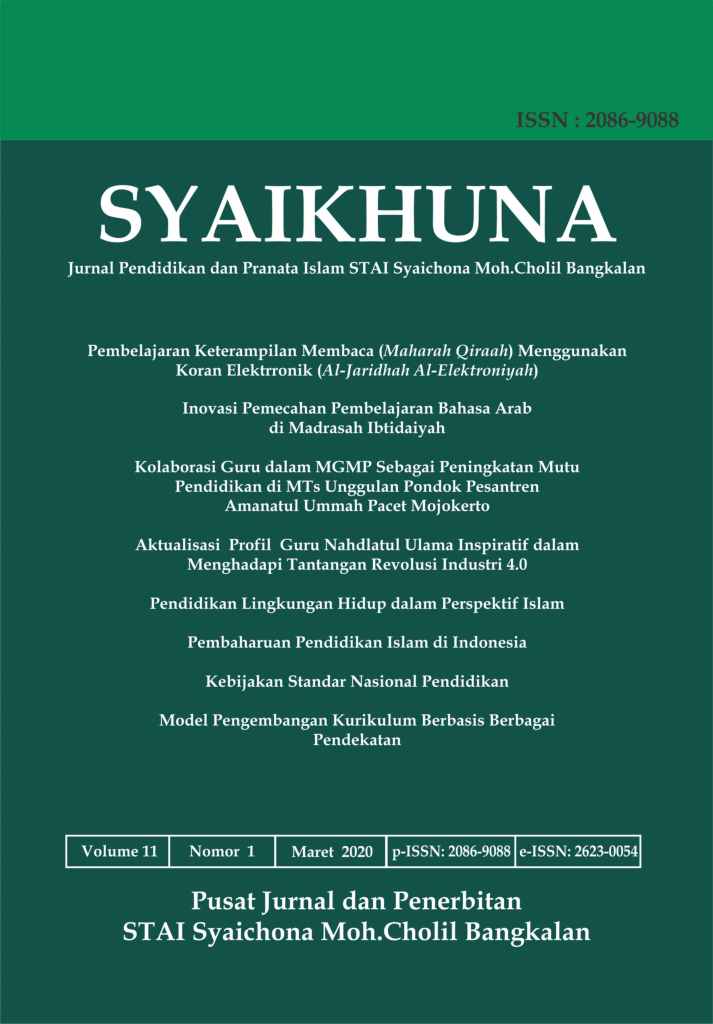Pendidikan Lingkungan Hidup dalam Perspektif Islam
DOI:
https://doi.org/10.36835/syaikhuna.v11i1.3844Keywords:
education, environment, perspective, IslamAbstract
Abstract: Preparing young poeple to be able to solve various environmental problems urgently to be done in order to improve and establish better environmental morality. Islam can be the basic and the main of how to build the character of students towards the environment through environmental education that is integrated with Islamic values. Islam forbids explicitly and harshly for humans to do damage on earth as a source of natural disasters as well as encouraging humans to have good character towards nature. Allah made human as caliph on earth, but in utilizing nature must maintain the balance and preservation of the environment, people who damage the environment are hypocrites and very disliked by Allah. Acording to God that peopole who damage the environment is the very transgressors. Element of Islamic values ​​on the environment can be used as material and the main foundation in environmental education in schools.References
Abdillah, M. 2005. Fikih Lingkungan. Yogyakarta: UPP AMP YKPN.
Basri, Hasan Mohammad, dkk. 2012. “Paradigma Eko-Filosofi: Melacak Titik Temu Sains, Agama (Islam) dan Budaya (Jawa) dalam Memaknai, dan Mengantisipasi Bencana†dalam Agama, Budaya, dan Bencana, Editor: Agus Indiyanto & Arqom Kuswanjono. Bandung: Mizan.
Chang, William. 2001. Moral Lingkungan Hidup Yogyakarta: Penerbit Kanisius
Gyallay, Peter. Environment: PAP-ETAP Reference Guide Book, Chapter 13. 2004 (http//www.un.org.kh/fae/pdfs/ section4/chapterxxx3/33 .pdf).
Haleem, Harfiyah. 2006. “The Eclogical Khalifah: Islam and Environment†dalam The Muslim World Book Review. Vol 27. Issue I. Auntum 2006
Hines, et.al. (2004). Global Issues and Environment Education. (http//www. eriese.org/erie/digest/digest-05/ html) (12 Oktober 2019).
Ichwan, Moch. Nur. 2012. “Eko-Teologi Bencana, Aktivisme Sosial, dan Politik Kemasalahatan†dalam Agama, Budaya, dan Bencana, Editor: Agus Indiyanto & Arqom Kuswanjono. Bandung: Mizan.
Kertanegara, Mulyadi, 2006. Gerbang Kearifan: Sebuah Pengantar Filsafat Islam. Jakarta: Lentera Hati.
Muhammad, Agus, 2007. Membangun Ketahanan Masyarakat Menghadapi Bencana: Perspektif Islam tentang Pengurangan Resiko Bencana. Jakarta: CBDRM-NU.
Muhaimin. 2015. Membangun Kecerdasan Ekologis: Model Pendidikan Untuk Peningkatan Kompetensi Ekologis. Bandung: Alfabeta.
Palmer, J. A & Phlip, N (1994). The Handbook of Environmental Education. London: Routledge.
Basri, Hasan Mohammad, dkk. 2012. “Paradigma Eko-Filosofi: Melacak Titik Temu Sains, Agama (Islam) dan Budaya (Jawa) dalam Memaknai, dan Mengantisipasi Bencana†dalam Agama, Budaya, dan Bencana, Editor: Agus Indiyanto & Arqom Kuswanjono. Bandung: Mizan.
Chang, William. 2001. Moral Lingkungan Hidup Yogyakarta: Penerbit Kanisius
Gyallay, Peter. Environment: PAP-ETAP Reference Guide Book, Chapter 13. 2004 (http//www.un.org.kh/fae/pdfs/ section4/chapterxxx3/33 .pdf).
Haleem, Harfiyah. 2006. “The Eclogical Khalifah: Islam and Environment†dalam The Muslim World Book Review. Vol 27. Issue I. Auntum 2006
Hines, et.al. (2004). Global Issues and Environment Education. (http//www. eriese.org/erie/digest/digest-05/ html) (12 Oktober 2019).
Ichwan, Moch. Nur. 2012. “Eko-Teologi Bencana, Aktivisme Sosial, dan Politik Kemasalahatan†dalam Agama, Budaya, dan Bencana, Editor: Agus Indiyanto & Arqom Kuswanjono. Bandung: Mizan.
Kertanegara, Mulyadi, 2006. Gerbang Kearifan: Sebuah Pengantar Filsafat Islam. Jakarta: Lentera Hati.
Muhammad, Agus, 2007. Membangun Ketahanan Masyarakat Menghadapi Bencana: Perspektif Islam tentang Pengurangan Resiko Bencana. Jakarta: CBDRM-NU.
Muhaimin. 2015. Membangun Kecerdasan Ekologis: Model Pendidikan Untuk Peningkatan Kompetensi Ekologis. Bandung: Alfabeta.
Palmer, J. A & Phlip, N (1994). The Handbook of Environmental Education. London: Routledge.
Downloads
Published
2020-03-28
How to Cite
Muhaimin, M. (2020). Pendidikan Lingkungan Hidup dalam Perspektif Islam. Syaikhuna: Jurnal Pendidikan Dan Pranata Islam, 11(1), 64–78. https://doi.org/10.36835/syaikhuna.v11i1.3844
Issue
Section
Articles





